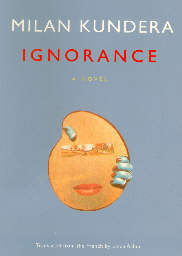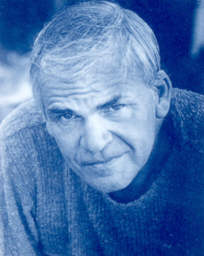After reading Mary McCarthy's Ideas and the Novel, it was interesting that the
next novel I read was all about an idea, the idea of "ignorance." There is one form of
ignorance that everyone is subject to it falls under the heading of Frost's "the path not
taken." What would have happened to us if we had arrived at a major decision point in our
lives and had taken the path we didn't take? This is a question that is particularly poignant
to emigrants who left a Communist country twenty years earlier and now are faced with
returning to their country to face those family members and friends who remained behind
while they fled. They will each confront in their own way, the myth of the "Great Return"
as Kundera calls it. This is the story of some of those emigrants. Will they remain in their
adopted country or return to their homeland?
This novel seems to be the fourth movement in a symphony of ideas coming as it does on the
heels of Kundera's three previous books, "Immortality ", "Slowness", and "Identity". How does
one write a novel about an idea? Kundera gives us an excellent case study in his latest one.
He likens the Great Return of the Czechs post-1989 to that of Odysseus whose
sojourn away from Ithaca lasted twenty years, the same amount of time the Czechs spent
under the Soviet domination after their 1969 self-emancipation. Kundera makes a point
about the significance of twenty years in the span of a lifetime and about the "Tell us!"
paradox that a Great Returner, like Odysseus, finds himself in.
[page 34, 35] After leaving Calypso, during his return journey, he was
shipwrecked in Phaeacia, whose king welcomed him to his court. There
he was a foreigner, a mysterious stranger. A stranger gets asked "Who
are you? Where do you come from? Tell us!" and he told. For four
long books of the Odyssey he had retraced in detail his adventures
before the dazzled Phaeacians. But in Ithaca he was not a stranger, he
was one of their own, so it never occurred to anyone to say, "Tell us!"
When the heroine of Ignorance returns for a visit to her Bohemia that she left over
twenty years earlier, she brought along a case of vintage Bordeaux as a special treat for her
old friends she invited to dinner at a restaurant. She was appalled to find them snub her
wine for their beer and lift their mugs to toast, "Health to Irena! Health to the
daughter who's returned." They only wanted to see and acknowledge the Irena they knew
twenty years ago, not to encounter the Irena who has matured and returned to them as an
adult, full of stories to tell. But no one asked her to tell her stories; they were too busy
telling all the things that happened in Bohemia to them while she was gone. In the middle of all the
"Remember when's," Irena felt amputated.
[page 43] Earlier, by their total uninterest in her experience abroad,
they amputated twenty years from her life. Now, with this
interrogation, they were trying to stitch her old past onto her present
life. As if they were amputating her forearm and attaching the hand
directly to the elbow; as if they were amputating her calves and joining
her feet to her knees.
Irena got the impression that if she went back to live with these people she would
have to lay her whole life in Paris "solemnly on the altar of the homeland and set fire to it."
[page 45] Twenty years of my life spent abroad would go up in smoke,
in a sacrificial ceremony. And the women would sing and dance with
me around the fire, with beer mugs raised high in their hands. That's
the price I'd have to pay to be pardoned. To be accepted. To become
one of them again.
Kundera gives us the two roots of the words nostalgia as coming from returning
(nostos) and pain (algos) to have nostalgia, one must have both a desire to return and a
feeling of pain about the return being unreachable. In this passage he talks about a young
girl who discovers nostalgia for the first time after a boy broke up with her. She began to
see out of the rear window of life for the first time.
[page 77, 78] Until then her view of time was the present moving
forward and devouring the future; she either feared its swiftness (when
she was awaiting something difficult) or rebelled at its slowness (when
she was awaiting something fine). Now time has a very different look;
it is no longer the conquering present capturing the future; it is the
present conquered and captured and carried off by the past. She sees a
young man disconnecting himself from her life and going away,
forevermore out of her reach. Mesmerized, all she can do is watch this
piece of her life move off; all she can do is watch it and suffer. She is
experiencing a brand-new feeling called nostalgia.
Thomas Wolfe said that we cannot go home again. It was his way of saying we
cannot step in the same river twice (Heraclitus) if we go home again, we find that home
has changed, and perhaps the very things we went home again for have disappeared.
Things change. It always happens before we know it because knowing can only come after
the change has occurred. Apart from Star Trek Voyager's holodeck, the quaint small town
of Fair Haven you remember from your childhood in Ireland cannot be reconstructed.
[page 124] We don't understand a thing about human life if we persist
in avoiding the most obvious fact: that a reality no longer is what it
was when it was; it cannot be reconstructed.
This is true whether it was twenty years ago or twenty milliseconds ago that it
happened. Life is one unique wave crashing on the shore after another.
Several years ago I met a man I knew back when I was in the seventh or eighth
grade. I hadn't seen him for over forty years. I remember distinctly and fondly long
summer days of picking Japanese plums along the Westwego Canal with him, building
balsa models of Spitfire airplanes, feeding his guinea pigs, and so forth. He remembered
none of those things. He didn't even remember me. This discrepancy between my memory
and his took me aback for some time. How could that happen? Kundera explains the
phenomenon this way.
[page 126] I imagine the feelings of two people meeting again after
many years. In the past they spent some time together, and therefore
they think they are linked by the same experience, the same
recollections. The same recollections? That's where the
misunderstanding starts: they don't have the same recollections; each
of them retains two or three small scenes from the past, but each has
his own; their recollections are not similar; they don't intersect; and
even in terms of quantity they are not comparable: one person
remembers the other more than he is remembered; first because
memory capacity varies among individuals, but also because they don't
hold the same importance for each other.
Irena explains to Milada the only woman who drank her Bordeaux wine in
Bohemia that first day, and the only one who said "Tell me!" what holds her to Paris. As
she talks about how she came to Paris as an emigrant, a child in her arms, one in her belly,
and a husband who died shortly after they arrived, she says, "You won't believe this, but
nowadays when I look back, those were my happiest years."
[page 162] She is shocked, herself, at having called "happiest" the
years after her husband's death, and she corrects herself, "What I
mean is, that was the one time I was master of my own life."
The presence of the word "I" twice in that last sentence is a key to understanding
what she meant. One feels happiest when one's "I" is active and working in one's life.
And the book's theme of ignorance creeps into the conversation when she says that she
married at age twenty. Since I got married, had my first child, and chose my profession at the age of twenty, I read with interest the following passage. Although I never considered any of those decisions of mine as an irreparable mistake, I will admit they were made at an age of ignorance.
[page 163]"An irreparable mistake committed at the age of ignorance."
"Yes."
"That's the age people marry, have their first child, choose a profession."
This next passage caught my attention because it shows an insight into the French
people, the French way of thinking, the French way of being. The British Constitution was
designed from the experiences in common law from the bottom up; the French
Constitution was designed from the top down this is the law and you will shape your
experiences accordingly.
[page 168] "Oh, the French, you know they have no need for
experience. With them, judgments precede experience."
By the end of the novel, Irena has met a man, a fellow emigrant who ended up in
Denmark, whom she remembered from Bohemia, but who did not remember her. The
theme of ignorance weaves in and out of the pages of this novel like the cord that binds the
book's signatures together. Open the book widely at any page and you will catch a glimpse
of it. And by the end of the book you will be a bit less ignorant of the tie that binds us to
our humanity.
~^~
Any questions about this review, Contact: Bobby Matherne
~~~~~~~~~~~~~~~~~~~~~~~~~~~~~~~~~~~~~~~~~~~~~~~~~~~~~~~~~~

 == == == == == == == == == == == == == == == ==
== == == == == == == == == == == == == == == ==
22+ Million Good Readers have Liked Us
22,454,155
as of November 7, 2019
Mo-to-Date Daily Ave 5,528
Readers
For Monthly DIGESTWORLD Email Reminder:
Subscribe! You'll Like Us, Too!
== == == == == == == == == == == == == == == ==
Click Left Photo for List of All ARJ2 Reviews Click Right Bookcover for Next Review in List
Did you Enjoy this Webpage?
Subscribe to the Good Mountain Press Digest: Click Here!


CLICK ON FLAGS TO OPEN OUR FIRST-AID KIT.
All the tools you need for a simple Speed Trace IN ONE PLACE. Do you feel like you're swimming against a strong current in your life? Are you fearful? Are you seeing red? Very angry? Anxious? Feel down or upset by everyday occurrences? Plagued by chronic discomforts like migraine headaches? Have seasickness on cruises? Have butterflies when you get up to speak? Learn to use this simple 21st Century memory technique. Remove these unwanted physical body states, and even more, without surgery, drugs, or psychotherapy, and best of all: without charge to you.
Simply CLICK AND OPEN the
FIRST-AID KIT.

Counselor? Visit the Counselor's Corner for Suggestions on Incorporating Doyletics in Your Work.

All material on this webpage Copyright 2019 by Bobby Matherne





